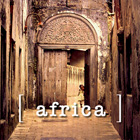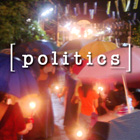
|
|||||||
Photo credit for "Africa" graphic, above: © 2005 Jennifer Lewis
|
CHAD CONFLICT RISK IN TURBULENT REGION
THREAT TO RETURN REFUGEES, ALLEGATIONS AGAINST SUDAN, ARMED BORDER CONFLICT 26 April 2006 In the region of the Chad-Sudan border, it is Sudan that has won most of the outside world's attention in recent years. This has been due to separate civil wars with rebels in the east, south and west of the country, the peace deal with the southern rebels and the ongoing campaign of ethnic cleansing in Darfur, backed by the Khartoum government. Now Chad, which has taken in huge numbers of refugees fleeing the genocide in Darfur, has a severe crisis with its own stability. The president, Idriss Deby, who represents a ruling ethnic minority, declared his intention to seek a third term, despite a constitutional limit of two terms. After he successfully removed the term limits by referendum last year, rebels in the southeast stepped up their campaign and have vowed to overthrow him. The large landlocked nation, a little more than three times the area of California, is rich in natural resources such as petroleum and uranium, as well as less immediate pressures on international relations, such as gold, limestone and salt, and even has a substantial fish catch from Lake Chad. At least 200 distinct ethnic groups comprise the population of less than 10 million, so control of the nation's government apparatus is sought by many rival factions who view Deby's government, as exploitative and undemocratic. During the last week the rebel group has staged multiple invasions of the capital N'Djamena. The government has repulsed the attempts to take the city, but only with fierce street to street fighting, tanks, heavy artillery and aircraft. Pres. Idriss Deby has blamed Sudan's government in Khartoum for allegedly backing the rebels and facilitating the assaults on N'Djamena. As a result, Deby threatened to return en masse any Darfur refugees on Chadian soil. That threat has since been withdrawn, after talks with the UN High Commissioner for Refugees and immediate and sustained pressure from foreign governments and NGOs. There is increasing pressure on Deby not to seek a third term, in hopes that a successful democratic process might calm tensions and give voice in an elective government to the concerns driving the rebel factions. There is also fear the conflict could turn into a massive, multifactional conflagration with Chad and Sudan at war with each other, and possibly, in a worst-case scenario, tapping into regional alliances and fomenting ethnically-driven mass-killings, as happened in the 1990s in Rwanda and DR Congo. African Union soldiers have been stationed in Darfur as part of an international effort to end the campaign of genocide carried out by the Sudanese-Arab militia known as "janjaweed" (meaning roughly 'soldiers on horseback') against ethnic African Sudanese villagers. That "stabilization force", by most accounts has not been able to halt the killing. Calls for an EU resolution, NATO reinforcements and/or UN Security Council vote to send a broader multinational force to the region have been fairly persistent, though none of these entities has yet opted to replace the AU forces. Chad, like Sudan, has resisted a role for foreign troops on its soil, as it has resisted the obligation to shelter political refugees from Sudan. But for now, it seems engaged with the UN and willing to continue to aid the Darfurians fleeing the militia reportedly backed by the Khartoum government. Natural resources, economic ills, border-related tensions and tribal overlap have inflamed cross-border tensions between a number of regional rivals across Africa, and some now fear heated political or possibly military conflict between Khartoum and N'Djamena could result in another brutal multipronged regional war, like those seen in recent decades in DR Congo, Uganda, Rwanda and between Ethiopia and Eritrea. Water and oil are key ingredients in the political upheaval in the region. Marginal groups often find themselves deprived of access to already scarce drinkable water and both Chad and Sudan are struggling to insinuate stable regimes into an unstable political and economic climate, in order to attract foreign investment for drilling and infrastructure. These factors combine with ethnic rivalries and black-market forces to create near constant risk of severe economic or political disintegration. In the case of Chad, tensions between the government of Idriss Deby and the border-region rebel factions seem as much ideological as about grabbing power, in both cases, and can be traced to an ongoing struggle to wrest access to vital resources from opposing or minority control. [s] |
||||||
|
|||||||

